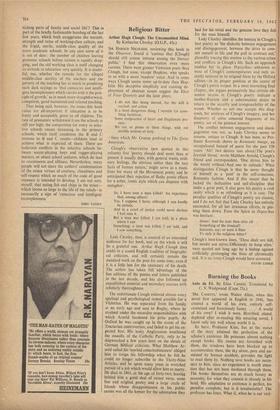Religious Bitter
Arthur Hugh Clough: The Uncommitted Mind. By Katharine Chorley. (O.U.P., 45s.) SIR HAROLD NICOLSON, reviewing this book in the Observer, found it 'curious that [Clough] should still arouse interest among the literary public.' I find this observation even more curious. There were greater Victorian poets than Clough, but none, except Hopkins, who speaks to us with a more 'modern' voice. And in some ways Clough seems more up-to-date than Hop- kins. His deceptive simplicity and cunning de- ployment of abstract nouns suggest the Eliot of Four Quartets and the later plays:
I do not like being moved, for the will is excited; and action Is a most dangerous thing; I tremble for some- thing factitious, Some malpractice of heart and illegitimate pro- cess;
We are so prone to these things, with our terrible notions of duty.
—lines which Mr. Greene prefixed to The Quiet American.
Clough's observation (not quoted in this volume) that 'poetry should deal more than at present it usually does, with general wants, ordi- nary feelings, the obvious rather than the rare facts of human nature,' might serve as a mani- festo for many of the Movement poets; and he anticipated their rejection of flashy poetic effects for a sober, ironic style which can dispense with metaphor: So, 1 have seen a man killed! An experience that, among others!
Yes, I suppose I have; although I can hardly be certain, And in a court of justice could never declare I had seen it.
But a man was killed, I am told, in a place where I saw Something; a man was killed, I am told, and I saw something.
Lady Chorley, then, is assured of an interested audience for her book, and on the whole it will be a grateful one. Arthur Hugh Clough does credit to a sound English tradition of biographi- cal criticism, and will certainly remain the standard work on the poet for some time, even if it is a little late for the centenary of his death. The author has taken full advantage of the fine editions of the poems and letters published in the last decade, and has also followed up unpublished material and secondary sources with scholarly thoroughness.
The unfortunate Clough endured almost every spiritual and psychological ordeal possible fora Victorian. He was separated from his family at an early age and sent to Rugby, where he strained under the excessive responsibilities with which Arnold burdened his prize pupils. At Oxford he was caught up in the storm of the Tractarian controversies, and failed to get his ex- pected first. His leaky Anglicanism weathered the assaults of the Catholic Party, only to be shipwrecked a few years later on the shoals of German Biblical criticism. What Matthew Ar- nold called his 'morbid conscientiousness' obliged him to resign his fellowship when he felt he could no longer subscribe to the Thirty-Nine Articles, and he spent many years in wretched pursuit of a job which would allow him to marry. He died in 1861, at the age of forty-two, leaving behind him a good deal of minor verse, some fine and original poetry and a large circle of friends whose disappointment in his public career was all the keener for the admiration they
had for his mind and the genuine love they felt for the man himself.
Lady Chorley identifies the tension in Clough's best poetry as 'the dialectic between engagement and disengagement, between the drive to com- mit oneself in life and the pull to contract out,' plausibly tracing this tension to the various crises and conflicts in Clough's life. Such an approach enables her to,.place Dipsychus—unknown to most of Clough's contemporaries and only re- cently restored to its original form by the Oxford editors—in its proper position at the centre of Clough's poetic output. In a most interesting final chapter, she argues persuasively that certain ob- sessive strains in Clough's poetry indicate a mother-fixation and a subconscious desire to return to the security and irresponsibility of the womb. Whether or not one accepts this diag- nosis, her analyses of Clough's imagery, and her discovery of some censored fragments of his poetry, are ot. the greatest interest.
The conflict between engagement and disen- gagement was not, as Lady Chorley seems to assume, unique to Clough. It has been, as Pro- fessor Kermode shows in Romantic Image, an occupational hazard of poets for the past 150 years. 'AM two desires toss about/The poet's feverish blood,' wrote Matthew Arnold, Clough's friend and correspondent, 'One drives him to the world without/And one to solitude.' What distinguishes Clough is that he never thought of himself as a 'poet' in the self-conscious, Romantic fashion. And if this meant that he lacked the dedication and self-discipline that make a great poet, it also gave his poetry a cool sanity which is as refreshing as it is rare. The peculiar qualities of Clough's poetry are elusive, and I do not feel that Lady Chorley has entirely succeeded, for all her strenuous efforts, in pin- ning them down. Even the Spirit in Dipsychus was hesitant :
Hmm! And the tone then after all Something of the ironical? Sarcastic, say; or were it fitter To style it the religious bitter?
Clough's best-known lines, 'Thou shalt not kill, but needst not strive/Officiously to keep alive,' were quoted not long ago by a bishop against artificially prolonging the lives of chronically sick. It is an irony Clough would have savoured.

































 Previous page
Previous page